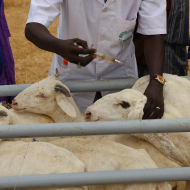
Research will aid the development of ChAdOx1 RVF for human use
The Rift Valley fever (RVF) vaccine is safe for pregnant animals, according to a collaborative study led by The Pirbright Institute.
The research, published in the journal npj Vaccines, found that pregnant sheep and goats vaccinated with a single dose of ChAdOx1 RVF remained healthy and suffered no pregnancy loss after being exposed to a virulent strain of RVF virus.
The team will use their discovery to progress the development of the vaccine, which could be the first to be used against both a human and animal disease.
“Our study has provided further evidence of the vaccine’s effectiveness and safety,” said Dr Anna Stedman, lead author of the study. “Ensuring ChAdOx1 RVF can be used in pregnant animals will help livestock owners to protect their animals in the event of an outbreak, which in turn will reduce their own risk of infection.”
Rift Valley fever is a virus that infects sheep, goats, cattle and camels. Prevalent across Africa and the Arabian Peninsula, the infection results in high mortality and poor outcomes during pregnancy.
RVF also poses a threat to human health, but no licenced human vaccine is currently available. People can contract the disease through contaminated tissues and fluids of livestock, as well as being bitten by infected mosquitoes.
ChAdOx1 RVF was previously shown to be safe and effective at protecting animals and has since been scheduled for human trials. Until now, however, its safety in pregnant animals has not been verified.
“This research will aid the development of ChAdOx1 RVF for human use, and for the first time we may see a vaccine that can be deployed against the same virus in both animals and humans,” said Professor Bryan Charleston, Director of The Pirbright Institute.
Professor George Warimwe, leader of the Rift Valley Fever Vaccine Programme at the University of Oxford added: “This has been a tremendous collaborative achievement. The excellent safety profile of the vaccine in pregnant livestock will support further development of the product for use in both livestock and humans.”



 The veterinary mental health charity Vetlife is inviting the veterinary community to join it for a sponsored cold-water dip.
The veterinary mental health charity Vetlife is inviting the veterinary community to join it for a sponsored cold-water dip.